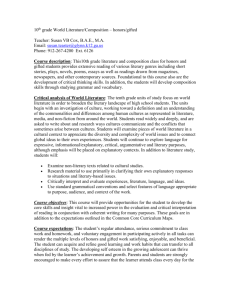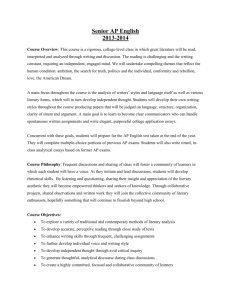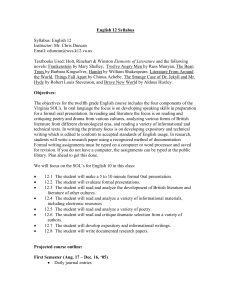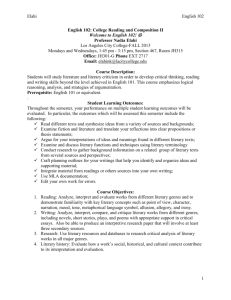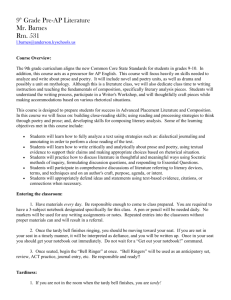AP English Literature and Composition
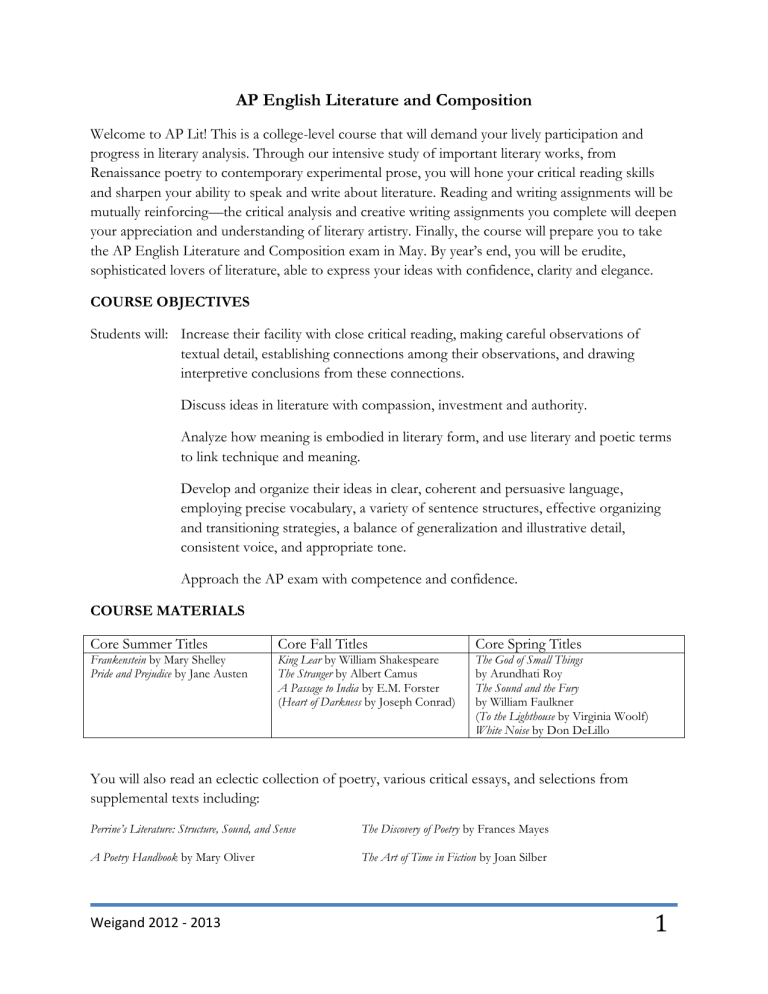
AP English Literature and Composition
Welcome to AP Lit! This is a college-level course that will demand your lively participation and progress in literary analysis. Through our intensive study of important literary works, from
Renaissance poetry to contemporary experimental prose, you will hone your critical reading skills and sharpen your ability to speak and write about literature. Reading and writing assignments will be mutually reinforcing—the critical analysis and creative writing assignments you complete will deepen your appreciation and understanding of literary artistry. Finally, the course will prepare you to take the AP English Literature and Composition exam in May. By year’s end, you will be erudite, sophisticated lovers of literature, able to express your ideas with confidence, clarity and elegance.
COURSE OBJECTIVES
Students will: Increase their facility with close critical reading, making careful observations of textual detail, establishing connections among their observations, and drawing interpretive conclusions from these connections.
Discuss ideas in literature with compassion, investment and authority.
Analyze how meaning is embodied in literary form, and use literary and poetic terms to link technique and meaning.
Develop and organize their ideas in clear, coherent and persuasive language, employing precise vocabulary, a variety of sentence structures, effective organizing and transitioning strategies, a balance of generalization and illustrative detail, consistent voice, and appropriate tone.
Approach the AP exam with competence and confidence.
COURSE MATERIALS
Core Summer Titles
Frankenstein by Mary Shelley
Pride and Prejudice by Jane Austen
Core Fall Titles
King Lear by William Shakespeare
The Stranger by Albert Camus
A Passage to India by E.M. Forster
(Heart of Darkness by Joseph Conrad)
Core Spring Titles
The God of Small Things by Arundhati Roy
The Sound and the Fury by William Faulkner
(To the Lighthouse by Virginia Woolf)
White Noise by Don DeLillo
You will also read an eclectic collection of poetry, various critical essays, and selections from supplemental texts including:
Perrine’s Literature: Structure, Sound, and Sense
A Poetry Handbook by Mary Oliver
The Discovery of Poetry by Frances Mayes
The Art of Time in Fiction by Joan Silber
Weigand 2012 - 2013
1
THE AP EXAM
The three-hour AP English Literature and Composition exam will begin at 8:00 a.m. on Thursday,
May 9, 2013.
Section I
1 hour (60 minutes)
55 – 60 multiple choice questions on short reading selections
Counts for 45% of total score
Scores based on number of questions answered correctly (1 point for correct answers, 0 points for incorrect answers, 0 points for unanswered questions)
COURSE ASSIGNMENTS & ACTIVITIES
Section II
2 hours (120 minutes)
3 free-response questions, each requiring a 40minute essay (one on poetry, either one poem or comparing and contrasting two poems; one on prose; one open, thematic question for which you choose the literary work you use in responding to the question)
Counts for 55% of total score
Scored by a team of college professors and AP
Lit teachers using a rubric and standardized procedures
Reading Logs: You will respond, react to and evaluate the core titles we read in class in reading logs. These informal journals, written in your personal voice, are not only frequent, critical writing practice but will often form the starting point for class discussion.
Class Discussion: Your participation is essential to the success of this course—and will likely be one of the most rewarding aspects of the year. You will offer your own thoughtful reactions to literature, listen to others’ responses, pose informed critical questions, make connections, and demonstrate on-going attempts to deepen individual and communal understanding. Come prepared, and be willing to share your experience, questions and insights.
Test Practice: Expect weekly practice on multiple-choice and essay questions. You will take approximately three multiple-choice practice tests over the course of the year, and gain understanding of Section I by occasionally writing AP style multiple-choice questions on the literature we read. You will write countless 40-minute essays based on AP exam prompts, and we will evaluate these in class using College Board scoring guidelines. One complete three-hour practice exam will be given one morning during the HSPE test week in the spring.
Essays: In the fall semester you will write and revise at least three formal, polished literary analysis essays, and one personal narrative college admissions essay. In the spring, the emphasis will shift to timed, in-class writing, although some take-home essays will be assigned.
Weigand 2012 - 2013
2
Literary Terms: Your success on the AP exam presupposes your familiarity with key literary terms, especially those which describe poetry. Through frequent analysis and discussion (and occasional quizzes), your competence and confidence will increase.
Creative Writing: Well-constructed creative writing assignments will help you see from the inside how literature is written. Most creative assignments will involve poetic forms and techniques, though we will also use imaginative prose to examine literary elements such as characterization and point of view.
COURSE POLICIES
Class Expectations: I expect you to come to class on time, refreshed and energized, and prepared to respond intelligently to the literature we’re studying. Bring the text we’re discussing to each class.
Don’t even think about using items that might distract you, me, or your classmates.
Grading: Your final semester grade will be calculated according to the following categories:
Essays (polished essays, in-class 40-minute writes) 40%
Other writing assignments (reading logs, craft exercises, etc.)
Participation (discussions, formal presentations, in-class activities, etc.)
Quizzes (literary terms and multiple-choice practice)
30%
20%
10%
Attendance and Make-up Work: A good portion of your semester grade is tied to your active engagement in class discussions, activities, and in-class writing. Failure to attend class may result in a failing grade for the semester, even if major assignments are completed. If you know in advance that you will be missing class, communicate with me as soon as possible about the activities and homework planned for the day(s) of your absence. If you miss class for an unexpected reason, it’s your responsibility to check the web site for homework information, ask a classmate about what you missed, make up work by the following class session, and see me before or after school if you have further questions. I will not accept work (including quizzes) missed because of an unexcused
tardy or absence.
Late Work: Because craft exercises and reading logs are intended to facilitate classroom learning, they must be completed on time, by the beginning of class on the assigned due date. I do not
accept late homework assignments. Major assignments (essays, formal presentations) will lose
10% for each class day they are late, earning a maximum of 50% if they are turned in more than five class days late.
Revisions: Because most effective instruction on writing occurs in the process of revision, certain assignments may be revised and resubmitted. Late assignments may not be revised for a higher grade.
Weigand 2012 - 2013
3


